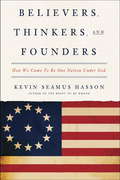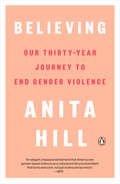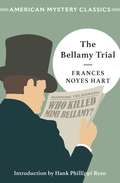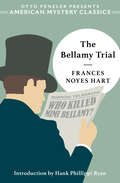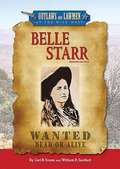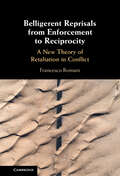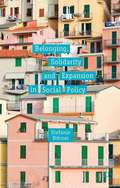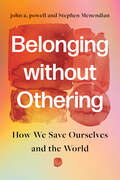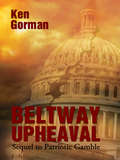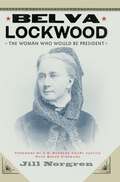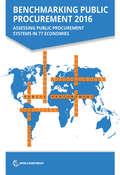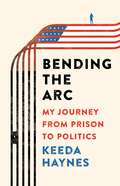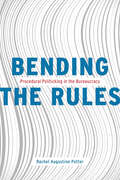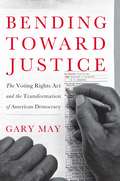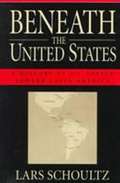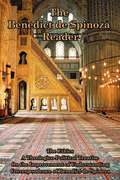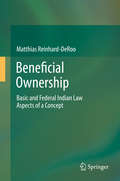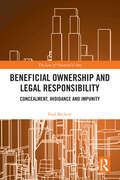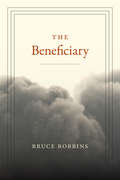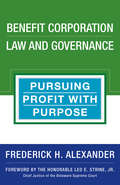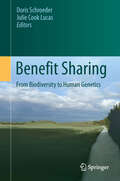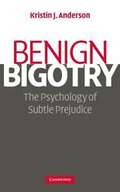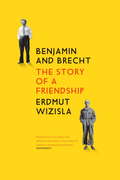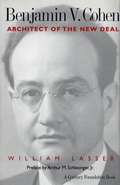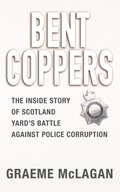- Table View
- List View
Believers, Thinkers, and Founders: How We Came to Be One Nation Under God
by Kevin Seamus HassonIn Believers, Thinkers and Founders: How We Came to be One Nation Under God, Kevin Seamus Hasson--founder and president emeritus of the Becket Fund for Religious liberty--offers a refreshing resolution to the age-old dispute surrounding the relationship of religion and state: a return to first principles. "The traditional position," writes Hasson, "is that our fundamental human rights--including those secured by the First Amendment--are endowed to us by the Creator and that it would be perilous to permit the government ever to repudiate that point." America has steadfastly taken the position that there is a Supreme Being who is the source of our rights and the author of our equality. It has repeated that point for well over two hundred years throughout all branches and levels of government. Never mind, says the secularist challenge. God is, to put it mildly, religious. Religion has no place in Government. So God has no place in Government. It's just that simple. But for the government to say there is no creator who endows us with rights, Hasson argues, "is to do more than simply tinker with one of the most famous one-liners in history; it is to change the starting point of our whole explanation of who we are as Americans." He proposes a solution straight from the founding: the government acknowledges the existence of God who is the source of our rights philosophically but not religiously. This idea of the "Philosophers' God" is a conception of God based not on faith but on reason. Hasson suggests that by recognizing the distinction between the creator of the Declaration of Independence and the God of our faith traditions, we may be able to move past the culture wars over religion that have plagued the country. In Believers, Thinkers, and Founders, Hasson examines the idea of the "Philosophers' God" while looking at a host of issues--including the Pledge of Allegiance, prayer at public events, and prayer in public schools--as he demonstrates how we can still be one nation under God.
Believing: Our Thirty-Year Journey to End Gender Violence
by Anita HillFrom the woman who gave the landmark testimony against Clarence Thomas as a sexual menace, a new manifesto about the origins and course of gender violence in our society; a combination of memoir, personal accounts, law, and social analysis, and a powerful call to arms from one of our most prominent and poised survivors. <p><p> In 1991, Anita Hill began something that's still unfinished work. The issues of gender violence, touching on sex, race, age, and power, are as urgent today as they were when she first testified. Believing is a story of America's three decades long reckoning with gender violence, one that offers insights into its roots, and paths to creating dialogue and substantive change. It is a call to action that offers guidance based on what this brave, committed fighter has learned from a lifetime of advocacy and her search for solutions to a problem that is still tearing America apart. <p><p> We once thought gender-based violence--from casual harassment to rape and murder--was an individual problem that affected a few; we now know it's cultural and endemic, and happens to our acquaintances, colleagues, friends and family members, and it can be physical, emotional and verbal. Women of color experience sexual harassment at higher rates than White women. Street harassment is ubiquitous and can escalate to violence. Transgender and nonbinary people are particularly vulnerable. Anita Hill draws on her years as a teacher, legal scholar, and advocate, and on the experiences of the thousands of individuals who have told her their stories, to trace the pipeline of behavior that follows individuals from place to place: from home to school to work and back home. In measured, clear, blunt terms, she demonstrates the impact it has on every aspect of our lives, including our physical and mental wellbeing, housing stability, political participation, economy and community safety, and how our descriptive language undermines progress toward solutions. And she is uncompromising in her demands that our laws and our leaders must address the issue concretely and immediately.
The Bellamy Trial
by Frances Noyes HartA scandalous murder trial reaches the heart of high society'An enthralling story' NEW YORK TIMESThe trial of Stephen Bellamy and Susan Ives, accused of murdering Bellamy's wife, lasts eight days. That's eight days of witnesses (some reliable, some not), eight days of cross-examination, and eight days of sensational courtroom theatrics lively enough to rouse the judge into frenzied calls for order. As each witness is brought to the stand, the mystery of the case only increases in all its sordid detail. By the time the closing arguments are made, the verdict shocks the entire courtroom.
The Bellamy Trial (American Mystery Classics)
by Frances Noyes HartA murder trial scandalizes the upper echelons of Long Island society, and the reader is on the jury… The trial of Stephen Bellamy and Susan Ives, accused of murdering Bellamy’s wife Madeleine, lasts eight days. That’s eight days of witnesses (some reliable, some not), eight days of examination and cross-examination, and eight days of sensational courtroom theatrics lively enough to rouse the judge into frenzied calls for order. Ex-fiancés, houseworkers, and assorted family members are brought to the stand—a cross-section of this wealthy Long Island town—and each one only adds to the mystery of the case in all its sordid detail. A trial that seems straightforward at its outset grows increasingly confounding as it proceeds, and surprises abound; by the time the closing arguments are made, however, the reader, like the jury, is provided with all the evidence needed to pass judgement on the two defendants. Still, only the most astute among them will not be shocked by the verdict announced at the end. Inspired by the most sensational murder trial of its day, The Bellamy Trial is a pioneering courtroom mystery, and one of the first of such books to popularize the form. It is included in the famed Haycraft-Queen Cornerstone list of the most definitive novels of the mystery genre.
Belle Starr (Outlaws and Lawmen of the Wild West)
by Carl R. Green William R. SanfordOne of the Wild West's most famous female outlaws, Belle Starr is known as the "Bandit Queen of the West." A sometime horse thief, Belle used her farmland as a hideaway for other outlaws. Authors Green and Sanford separate the fact from the fiction about her extraordinary life in this book from the Outlaws and Lawmen of the Wild West series. REVISED EDITION.
Belligerent Reprisals from Enforcement to Reciprocity: A New Theory of Retaliation in Conflict
by Francesco RomaniThis book challenges the traditional understanding of belligerent reprisals as a mechanism aimed at enforcing the laws of armed conflict. By re-instating reciprocity at the core of belligerent reprisals, it construes them as tools designed to re-calibrate the legal relationship between parties to armed conflict and pursue the belligerents' equality of rights and obligations in both a formal and a substantive sense. It combines an inquiry into the conceptual issues surrounding the notion of belligerent reprisals, with an analysis of State and international practice on their purpose and function. Encompassing international and non-international armed conflicts, it provides a first comprehensive account of the role of reprisals in governing legal interaction during wartime, and offers new grounds to address questions on their applicability, lawfulness, regulation, and desirability. This title is part of the Flip it Open Programme and may also be available Open Access. Check our website Cambridge Core for details.
Belonging, Solidarity and Expansion in Social Policy
by Stefanie BörnerThis book examines the relationship of belonging and social policy in a historical-comparative perspective reconstructing individual arguments in favour of or opposed to the expansion of solidarities.
Belonging without Othering: How We Save Ourselves and the World
by john a. powell Stephen MenendianThe root of all inequality is the process of othering – and its solution is the practice of belonging We all yearn for connection and community, but we live in a time when calls for further division along the well-wrought lines of religion, race, ethnicity, caste, and sexuality are pervasive. This ubiquitous yet elusive problem feeds on fears – created, inherited – of the "other." While the much-touted diversity, equity, and inclusion initiatives are undeniably failing, and activists narrowly focus on specific and sometimes conflicting communities, Belonging without Othering prescribes a new approach that encourages us to turn toward one another in unprecedented and radical ways. The pressures that separate us have a common root: our tendency to cast people and groups in irreconcilable terms – or the process of "othering." This book gives vital language to this universal problem, unveiling its machinery at work across time and around the world. To subvert it, john a. powell and Stephen Menendian make a powerful and sweeping case for adopting a paradigm of belonging that does not require the creation of an "other." This new paradigm hinges on transitioning from narrow to expansive identities – even if that means challenging seemingly benevolent forms of community-building based on othering. As the threat of authoritarianism grows across the globe, this book makes the case that belonging without othering is the necessary, but not the inevitable, next step in our long journey toward creating truly equitable and thriving societies. The authors argue that we must build institutions, cultivate practices, and orient ourselves toward a shared future, not only to heal ourselves, but perhaps to save our planet as well. Brimming with clear guidance, sparkling insights, and specific examples and practices, Belonging without Othering is a future-oriented exploration that ushers us in a more hopeful direction.
Beltway Upheaval
by Kenneth GormanThe Country has experienced bizarre political events. First, a contingent election in the House of Representatives after no candidate for president garnered 270 electoral votes. Then, the victorious president resigned suddenly on Inauguration Day. Is President Granger guilty of concealing a secret about resigned President Atkinsen in order to succeed him? Speaker of the House Allcott despises Granger who "stole the presidency from me." Granger foresees a disastrous economic decline. He signs Executive Order 14914 to ward off a depression. Allcott condemns the EO and influences the House to Impeach Granger. The Senate decides Granger's fate. Is Allcott guilty of conspiracies? What is the fallout from the Executive Order? Unexpectedly, Granger takes a leave of absence. Who becomes acting president? BELTWAY UPHEAL is a fictional story of presidential actions and conflicts. Can real transformation happen?
Belva Lockwood: The Woman Who Would Be President
by Jill NorgrenA legal historian recounts the influential life of the women&’s rights activist who was the first woman to practice at the bar of the Supreme Court. In Belva Lockwood: The Woman Who Would Be President, prize-winning legal historian Jill Norgren recounts, for the first time, the life story of one of the nineteenth century&’s most surprising and accomplished advocates for women&’s rights. As Norgren shows, Lockwood was fearless in confronting the male establishment, commanding the attention of presidents, members of Congress, influential writers, and everyday Americans. Obscured for too long in the historical shadow of her longtime colleague, Susan B. Anthony, Lockwood steps into the limelight at last in this engaging new biography. Born on a farm in upstate New York in 1830, Lockwood married young and reluctantly became a farmer&’s wife. After her husband&’s premature death, however, she earned a college degree, became a teacher, and moved to Washington, D.C., with plans to become an attorney-an occupation all but closed to women. Not only did she become one of the first female attorneys in the U.S., but in 1879 became the first woman ever allowed to practice at the bar of the Supreme Court. In 1884 Lockwood continued her trailblazing ways as the first woman to run a full campaign for the U.S. Presidency. She ran for President again in 1888. Although her candidacies were unsuccessful (as she knew they would be), Lockwood demonstrated that women could compete with men in the political arena. After these campaigns she worked tirelessly on behalf of the Universal Peace Union, hoping, until her death in 1917, that she, or the organization, would win the Nobel Peace Prize. Belva Lockwood deserves to be far better known. As Norgren notes, it is likely that Lockwood would be widely recognized today as a feminist pioneer if most of her personal papers had not been destroyed after her death. Fortunately for readers, Norgren shares much of her subject&’s tenacity and she has ensured Lockwood&’s rightful place in history with this meticulously researched and beautifully written book. Foreword by U.S. Supreme Court Justice Ruth Bader Ginsburg
Benchmarking Public Procurement 2016
by World Bank GroupPublic procurement accounts for around one-fifth of global gross domestic product (GDP). Given its size the public procurement market can improve public sector performance, promote national competitiveness, drive domestic economic growth, and boost economic development. Launched at the request of the G20 Anti-Corruption Working Group, Benchmarking Public Procurement presents actionable indicators to help countries identify and monitor policies and regulations that impact how private sector companies do business with the government in 77 economies. The Benchmarking Public Procurement 2016 report is organized under two parts: the public procurement life cycle and the complaint and reporting mechanisms indicators. Data was gathered using standardized questionnaires distributed to expert contributors in each economy. The project builds on the Doing Business methodology and aims to promote evidence-based decision making by governments and shed light over areas where few empirical data have been presented so far.
Bending the Arc: My Journey from Prison to Politics
by Keeda J. HaynesA searing exposé of the profound failures in our justice system, told by a woman who has journeyed from wrongfully accused prisoner to acclaimed public defender Keeda Haynes was a Girl Scout and a churchgoer, but after college graduation, she was imprisoned for a crime she didn&’t commit. Her boyfriend had asked her to sign for some packages—packages she did not know were filled with marijuana. As a young Black woman falsely accused, prosecuted, and ultimately imprisoned, Haynes suffered the abuses of our racist and sexist justice system. But rather than give in to despair, she decided to fight for change. After her release, she attended law school at night, became a public defender, and ultimately staged a highly publicized campaign for Congress. At every turn of her unlikely story, she gives unique insights into the inequities built into our institutions. In the end, despite the injustice she endured, she emerges convinced that ours can become a true second-chance culture.
Bending the Rules: Procedural Politicking in the Bureaucracy
by Rachel Augustine PotterWho determines the fuel standards for our cars? What about whether Plan B, the morning-after pill, is sold at the local pharmacy? Many people assume such important and controversial policy decisions originate in the halls of Congress. But the choreographed actions of Congress and the president account for only a small portion of the laws created in the United States. By some estimates, more than ninety percent of law is created by administrative rules issued by federal agencies like the Environmental Protection Agency and the Department of Health and Human Services, where unelected bureaucrats with particular policy goals and preferences respond to the incentives created by a complex, procedure-bound rulemaking process. With Bending the Rules, Rachel Augustine Potter shows that rulemaking is not the rote administrative activity it is commonly imagined to be but rather an intensely political activity in its own right. Because rulemaking occurs in a separation of powers system, bureaucrats are not free to implement their preferred policies unimpeded: the president, Congress, and the courts can all get involved in the process, often at the bidding of affected interest groups. However, rather than capitulating to demands, bureaucrats routinely employ “procedural politicking,” using their deep knowledge of the process to strategically insulate their proposals from political scrutiny and interference. Tracing the rulemaking process from when an agency first begins working on a rule to when it completes that regulatory action, Potter shows how bureaucrats use procedures to resist interference from Congress, the President, and the courts at each stage of the process. This exercise reveals that unelected bureaucrats wield considerable influence over the direction of public policy in the United States.
Bending Toward Justice: The Voting Rights Act and the Transformation of American Democracy
by Gary MayWhen the Fifteenth Amendment of 1870 granted African Americans the right to vote, it seemed as if a new era of political equality was at hand. Before long, however, white segregationists across the South counterattacked, driving their black countrymen from the polls through a combination of sheer terror and insidious devices such as complex literacy tests and expensive poll taxes. Most African Americans would remain voiceless for nearly a century more, citizens in name only until the passage of the 1965 Voting Rights Act secured their access to the ballot. In "Bending Toward Justice," celebrated historian Gary May describes how black voters overcame centuries of bigotry to secure and preserve one of their most important rights as American citizens. The struggle that culminated in the passage of the Voting Rights Act was long and torturous, and only succeeded because of the courageous work of local freedom fighters and national civil rights leadersOCoas well as, ironically, the opposition of Southern segregationists and law enforcement officials, who won public sympathy for the voting rights movement by brutally attacking peaceful demonstrators. But while the Voting Rights Act represented an unqualified victory over such forces of hate, May explains that its achievements remain in jeopardy. Many argue that the 2008 election of President Barack Obama rendered the act obsolete, yet recent years have seen renewed efforts to curb voting rights and deny minorities the actOCOs hard-won protections. Legal challenges to key sections of the act may soon lead the Supreme Court to declare those protections unconstitutional. A vivid, fast-paced history of this landmark piece of civil rights legislation, "Bending Toward Justice" offers a dramatic, timely account of the struggle that finally won African Americans the ballotOCoalthough, as May shows, the fight for voting rights is by no means over. "
Beneath the United States: A History of U. S. Policy Toward Latin America
by Lars Schoultz<p>In this sweeping history of United States policy toward Latin America, Lars Schoultz shows that the United States has always perceived Latin America as a fundamentally inferior neighbor, unable to manage its affairs and stubbornly underdeveloped. <p>This perception of inferiority was apparent from the beginning. John Quincy Adams, who first established diplomatic relations with Latin America, believed that Hispanics were "lazy, dirty, nasty...a parcel of hogs." In the early nineteenth century, ex-President John Adams declared that any effort to implant democracy in Latin America was "as absurd as similar plans would be to establish democracies among the birds, beasts, and fishes." <p>Drawing on extraordinarily rich archival sources, Schoultz, one of the country's foremost Latin America scholars, shows how these core beliefs have not changed for two centuries. We have combined self-interest with a "civilizing mission"--a self-abnegating effort by a superior people to help a substandard civilization overcome its defects. William Howard Taft felt the way to accomplish this task was "to knock their heads together until they should maintain peace," while in 1959 CIA Director Allen Dulles warned that "the new Cuban officials had to be treated more or less like children." Schoultz shows that the policies pursued reflected these deeply held convictions. <p>While political correctness censors the expression of such sentiments today, the actions of the United States continue to assume the political and cultural inferiority of Latin America. Schoultz demonstrates that not until the United States perceives its southern neighbors as equals can it anticipate a constructive hemispheric alliance.</p>
The Benedict de Spinoza Reader
by Benedict De SpinozaBenedict de Spinoza's writings laid the groundwork for the 18th century Enlightenment and for modern Biblical criticism. By virtue of his magnum opus, the Ethics, Spinoza is considered one of Western philosophy's definitive ethicists. Men would never be superstitious, if they could govern all their circumstances by set rules, or if they were always favoured by fortune: but being frequently driven into straits where rules are useless, and being often kept fluctuating pitiably between hope and fear by the uncertainty of fortune's greedily coveted favours, they are consequently, for the most part, very prone to credulity. The human mind is readily swayed this way or that in times of doubt, especially when hope and fear are struggling for the mastery, though usually it is boastful, over-confident, and vain. After experience had taught me that all the usual surroundings of social life are vain and futile; seeing that none of the objects of my fears contained in themselves anything either good or bad, except in so far as the mind is affected by them, I finally resolved to inquire whether there might be some real good having power to communicate itself, which would affect the mind singly, to the exclusion of all else: whether, in fact, there might be anything of which the discovery and attainment would enable me to enjoy continuous, supreme, and unending happiness. Spinoza was one of the great rationalists of 17th century philosophy. He helped lay the groundwork for the 18th century Enlightenment and modern biblical criticism. His correspondence helps shed light on his ethical opinions and positions. Required reading for those who wish a deeper understanding of the writings of Benedict de Spinoza.
Beneficial Ownership: Basic and Federal Indian Law Aspects of a Concept
by Matthias Reinhard-DerooThe hunt for beneficial owners is on. Like an elephant, the beneficial owner hides in the jungle of complex legal structures, waiting to be discovered by eager prosecutors. But what lies behind this metaphor? What is a Beneficial Owner? Is beneficial ownership a right? What does this right encompass? What is the value of this right compared to other rights? And if beneficial ownership is not a right, is it still a legally relevant relation? How do courts, namely the U. S. Supreme Court deal with the concept? When do Anglo-American judges and European scholars resort to the concept? This book approaches these questions from two perspectives: legal fundamentals and the field of U. S. federal Indian law. Both legal theories and case law are scrutinized with the aim to find a better understanding of the basic conception and characteristics of beneficial ownership Federal Indian law has been chosen for the study of the concrete implications of the beneficial ownership concept in what Roscoe Pound referred to as "the law in action. " To some, this choice of legal field might seem somewhat unusual. What answers could federal Indian law possibly offer with regard to pressing questions from the financial industry? As always, there is a short and a long answer. The short answer is that the analysis of an equally sophisticated field of law can open new perspectives on a given field of law. For example, not only potential criminals and tax evaders but also members of an older civilization are beneficial owners. The long answer can be found in this very book.
Beneficial Ownership and Legal Responsibility: Concealment, Avoidance and Impunity (The Law of Financial Crime)
by Paul BeckettThis book explores the connection between ownership, on one hand, and immunity from legal responsibility, on the other. It presents a definition of the concept of beneficial ownership, the reasons for its concealment, and failures in international legal structures and arrangements. Globally, States confront complex criminality, such as corruption, tax evasion, doctrinal fanaticism, trafficked slaves, terrorism and, war. At the personal level, men and women may seek to escape their creditors, to disinherit unwanted heirs, to cheat divorced partners, and to appear straightforward when this is not the case. The response of politicians and regulators has been a global State initiative to identify beneficial owners via public registers to promote transparency and accountability. Yet, at the same time, there is an equally powerful global and personal counter-initiative to promote beneficial ownership avoidance. Where there is no owner, there is no accountability. This book examines what “ownership” means in legal terms across multiple legal systems and explains why singling out “ownership” as being pivotal to State and personal accountability is a strategy both flawed and disingenuous. It is argued that an apparent lack of political will coupled with shape-shifting definitions of “ownership” have resulted in tokenism. Particular attention is paid to those “orphan” structures which have evolved from standard models, or which have been designed for the purpose in each case of facilitating ownership concealment and avoidance. The author explains how the virtual world of the blockchain, crypto-assets and cryptocurrency, and virtual entities such as the Decentralised Autonomous Organisation (DAO), all of which elude legal classification, have opened a new world of possibilities. Applicable across all jurisdictions and legal systems, the book will be a valuable resource for academics, researchers, and policy-makers working in the areas of Financial Crime, Regulation, Compliance, Business, and Accountancy.
The Beneficiary
by Bruce RobbinsFrom iPhones and clothing to jewelry and food, the products those of us in the developed world consume and enjoy exist only through the labor and suffering of countless others. In his new book Bruce Robbins examines the implications of this dynamic for humanitarianism and social justice. He locates the figure of the "beneficiary" in the history of humanitarian thought, which asks the prosperous to help the poor without requiring them to recognize their causal role in the creation of the abhorrent conditions they seek to remedy. Tracing how the beneficiary has manifested itself in the work of George Orwell, Virginia Woolf, Jamaica Kincaid, Naomi Klein, and others, Robbins uncovers a hidden tradition of economic cosmopolitanism. There are no easy answers to the question of how to confront systematic inequality on a global scale. But the first step, Robbins suggests, is to acknowledge that we are, in fact, beneficiaries.
Benefit Corporation Law and Governance: Pursuing Profit with Purpose
by Frederick H. AlexanderCorporations with a ConscienceCorporations today are embedded in a system of shareholder primacy. Nonfinancial concerns—like worker well-being, environmental impact, and community health—are secondary to the imperative to maximize share price. Benefit corporation governance reorients corporations so that they work for the interests of all stakeholders, not just shareholders. This is the first authoritative guide to this new form of governance. It is an invaluable guide for legal and financial professionals, as well as interested entrepreneurs and investors who want to understand how purposeful corporate governance can be put into practice.
Benefit Sharing: From Biodiversity to Human Genetics
by Doris Schroeder Julie Cook LucasBiomedical research is increasingly carried out in low- and middle-income countries. International consensus has largely been achieved around the importance of valid consent and protecting research participants from harm. But what are the responsibilities of researchers and funders to share the benefits of their research with research participants and their communities? After setting out the legal, ethical and conceptual frameworks for benefit sharing, this collection analyses seven historical cases to identify the ethical and policy challenges that arise in relation to benefit sharing. A series of recommendations address possible ways forward to achieve justice for research participants in low- and middle-income countries.
Benign Bigotry: The Psychology of Subtle Prejudice
by Kristin J. AndersonWhile overt prejudice is now much less prevalent than in decades past, subtle prejudice - prejudice that is inconspicuous, indirect, and often unconscious - continues to pervade our society. Laws do not protect against subtle prejudice and, because of its covert nature, it is difficult to observe and frequently goes undetected by both perpetrator and victim. Benign Bigotry uses a fresh, original format to examine subtle prejudice by addressing six commonly held cultural myths based on assumptions that appear harmless but actually foster discrimination: 'those people all look alike'; 'they must be guilty of something'; 'feminists are man-haters'; 'gays flaunt their sexuality'; 'I'm not a racist, I'm color-blind' and 'affirmative action is reverse racism'. Kristin J. Anderson skillfully relates each of these myths to real world events, emphasizes how errors in individual thinking can affect society at large, and suggests strategies for reducing prejudice in daily life.
Benjamin and Brecht: The Story of a Friendship
by Erdmut Wizisla Christine ShuttleworthA fascinating account of the friendship between two of the most brilliant minds of the twentieth centuryGermany in the mid 1920s, a place and time of looming turmoil, brought together Walter Benjamin--acclaimed critic and extraordinary literary theorist--and Bertolt Brecht, one of the twentieth century's most influential playwrights. It was a friendship that would shape their writing for the rest of their lives.In this groundbreaking work, Erdmut Wizisla explores what this relationship meant for them personally and professionally, as well as the effect it had on those around them. From the first meeting between Benjamin and Brecht to their experiences in exile, these eventful lives are illuminated by personal correspondence, journal entries and private miscellany--including previously unpublished materials--detailing the friends' electric discussions of their collaboration. Wizisla delves into the archives of other luminaries in the distinguished constellation of writers and artists in Weimar Germany, which included Margarete Steffin, Theodor Adorno, Ernst Bloch and Hannah Arendt. Wizisla's account of this friendship opens a window on nearly two decades of European intellectual life.From the Trade Paperback edition.
Benjamin V. Cohen: Architect of the New Deal
by William LasserThis is a biography of Benjamin V. Cohen focusing on the "New Deal" giant.
Bent Coppers
by Graeme McLaganThe inside story of a secret unit that has worked under cover to expose corruption in the Metropolitan Police since the early 1990s.'If you want a book that is genuinely 'unputdownable' read BENT COPPERS' Johnny Vaughan, THE SUN'A very engaging read - the outrageous nature of bent cops' behaviour guarantees that' SUNDAY TELEGRAPHShocked by the extent of corruption within its ranks, Scotland Yard set up a new anti-corruption unit in the early 1990s. Its members had to operate in conditions of unprecedented secrecy and they became known as the 'Ghost Squad'.Bent Coppers really did believe they were untouchable: they stole cash and property, fitted-up innocent people and sold secret information to cripple court cases. Many of the bent coppers are now in jail or awaiting trial but the battle against corruption is not over.Only now can the story of the 'Ghost Squad' be revealed. Award-winning BBC home affairs correspondent Graeme McLagan had followed the investigation since the beginning. He has interviewed undercover officers and many of the bent coppers they have exposed. this is the inside story of the 'Ghost Squad' and how it broke into the secret world of police corruption.
